Namibia Extends Election Voting Amid Allegations of Fraud and Logistical Issues

Namibia has extended voting in its presidential elections into the weekend due to ballot paper shortages, raising concerns from opposition parties about possible fraud. Long lines have formed at polling stations, with many voters frustrated by logistical delays. Vice President Netumbo Nandi-Ndaitwah is a candidate for president, aiming to become the country’s first female leader, amidst rising dissatisfaction among the youth regarding economic hardships.
Namibia’s electoral agency has unexpectedly extended the voting period for presidential and parliamentary elections into the weekend, following reports of ballot paper shortages. Initially set to conclude on Wednesday, polling will now continue until Saturday night, raising concerns from the principal opposition party, the Independent Patriots for Change, which has voiced allegations of fraud regarding this decision.
The chairperson of the Electoral Commission of Namibia, Elsie Nghikembua, attributed the delays to “logistical” challenges that prevented many voters from casting their ballots. Reports indicate that numerous polling stations, particularly in rural areas, are still awaiting ballot deliveries, leading to long queues. One frustrated voter recounted, “I keep coming to the same place every day without being assisted. It’s like you are a mad person.”
Vice President Netumbo Nandi-Ndaitwah, who is running for the presidency as the candidate of the ruling South West Africa People’s Organization (SWAPO), aims to become Namibia’s first female leader. However, she faces tough competition from a disillusioned electorate, grappling with high unemployment and economic disparities in a nation rich in mineral resources.
This situation parallels ongoing unrest in Mozambique after allegations of election rigging have led to violent protests against the ruling Frelimo party. As Namibia navigates its electoral challenges, it remains one of the continent’s more stable democracies since gaining independence in 1990, with previous elections generally regarded as fair. Nonetheless, the current sentiments of frustration among younger voters could signal a turning point as they demand accountability and change in governance.
The decision to extend voting hours in Namibia stems from technical difficulties faced by the electoral commission, specifically related to ballot paper shortages. This decision has prompted challenges from the opposition, reflecting a larger trend of electoral dissatisfaction within the context of Southern African politics. Historically, Namibia’s elections have been viewed as credible, partly due to the legacy of SWAPO, which has been in power since independence in 1990, following a long struggle against colonial rule and apartheid. The youth, however, are increasingly frustrated by unemployment and economic inequality, leading to a potential shift in political sentiment.
In conclusion, Namibia’s decision to extend the election period due to logistical issues highlights the ongoing challenges within its electoral processes. The reaction from opposition parties and the frustrations expressed by voters underscore the need for reforms to ensure that future elections are conducted seamlessly. This scenario not only reflects Namibia’s unique political landscape but also ties into broader regional movements as citizens seek more responsive governance.
Original Source: apnews.com







